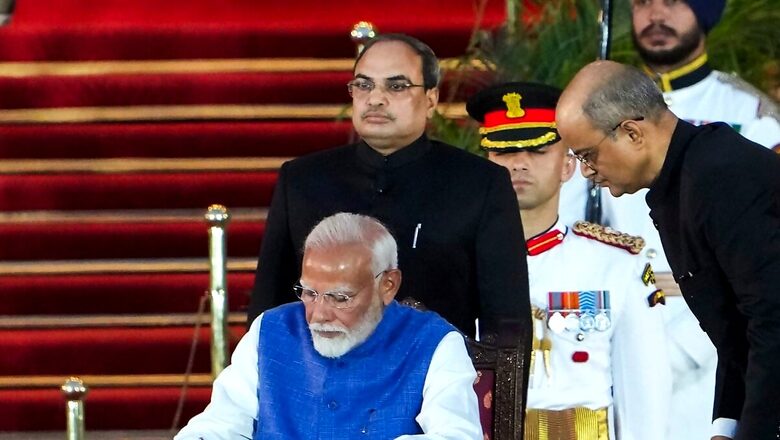
views
Following the 2024 Lok Sabha elections, the BJP-led NDA government has been formed under the leadership of Prime Minister Narendra Modi. This marks a historic moment, with Modi forming the government for the third consecutive time, despite facing a reduction in the number of seats. The Opposition has interpreted the BJP’s failure to secure an outright majority as a sign of their defeat. However, this narrative overlooks the resilience and adaptability of the BJP’s coalition politics.
While the numbers of the BJP have decreased, it does not signify an end to its governance agenda, focused on India’s development and cultural revival. The saffron party has a proven track record of managing successful coalition governments, as evidenced by the leadership of Atal Bihari Vajpayee and his deputy Lal Krishna Advani. The current scenario is another challenge in a democratic framework, but it also serves to strengthen the BJP’s core ideologies and policies through coalition dynamics.
Prime Minister Modi’s new NDA government sends a strong rebuttal to Opposition propaganda. The formation of Modi’s 3.0 cabinet is a clear message that the BJP’s political strength and ideological commitment remain intact, regardless of the seat count. PM Modi’s unwavering focus on the development and the cultural revival of Bharat stands firm. The BJP is prepared to engage in respectful negotiations with its allies to ensure the continuity of its policy, and political, geopolitical, and economic agendas.
BJP Will Lead
The reconstitution of the Modi cabinet has been a subject of intense scrutiny and interpretation. The retention of stalwarts like Amit Shah, Rajnath Singh, Nirmala Sitharaman, S. Jaishankar, Nitin Gadkari, and Bhupendra Yadav sends a robust signal to the Opposition: the BJP is unwavering in its core governance philosophy and is not willing to compromise on key ministerial positions. This strategic move by Prime Minister Narendra Modi not only consolidates the BJP’s position but also reaffirms its commitment to its foundational policies concerning internal and external security, economic reform, and infrastructure development.
The message is unequivocal – the BJP is here to lead with a steady hand, and there will be no dilution of its agenda or priorities in the face of coalition politics.
The Opposition’s narrative that the BJP would be compelled to cede important cabinet posts to its allies has been effectively countered. The reappointment of experienced ministers indicates a continuity of policy and an emphasis on stability and experience in governance. This is particularly significant at a time when India faces numerous challenges on various fronts, including economic recovery post-pandemic, border security issues, and the need for infrastructural growth.
Moreover, this cabinet reshuffle is a testament to the BJP’s ability to balance alliance dynamics while maintaining a firm grip on the steering wheel of the government. It underscores the party’s confidence in its leadership and policy direction, which has been endorsed by the electorate in successive elections.
In essence, the composition of the new Modi cabinet is a strategic masterstroke that reinforces the BJP’s leadership narrative. It is a clear declaration that the party is not only in command but is also prepared to lead India towards a future defined by robust security, dynamic diplomacy, and sustainable development.
No Compromise on Politics, Ideology
One of the most significant messages conveyed through the new cabinet is that the BJP’s ideological base will not be diluted. By retaining key figures like Amit Shah, Rajnath Singh, and Nitin Gadkari, who have been instrumental in driving the party’s vision and policies, the Modi government signals continuity in its ideological stance. These leaders have been pivotal in shaping the BJP’s approach to governance, emphasising economic development, national security, and cultural revival. Their continued presence in the cabinet ensures that these priorities will remain at the forefront of the government’s agenda. Moreover, the induction of BJP president JP Nadda is a message that the politics of the BJP will not be compromised at all.
Additionally, the inclusion of loyalists and seasoned politicians like Shivraj Singh Chouhan and Manohar Lal Khattar highlights the BJP’s strategy to maintain a strong ideological coherence. These leaders are not only experienced administrators but also staunch supporters of the party’s foundational values. Their roles in the cabinet reinforce the message that the BJP’s political and ideological ethos will be upheld, irrespective of coalition dynamics. This is why the narrative that the BJP will shift from its ideological agenda is not standing.
In conclusion, the new Modi cabinet is a testament to the BJP’s steadfastness in its political and ideological pursuits. It communicates to the Opposition and the nation that while coalition dynamics may require tactical adjustments, the BJP’s foundational principles and long-term vision for India remain non-negotiable.
Experience Is Key
In the wake of Narendra Modi’s historic third term as prime minister, critics have raised concerns about his ability to manage a coalition government, citing his perceived lack of experience in such arrangements. However, Modi’s strategic cabinet formation, which includes seven former chief ministers, serves as a robust counter to these allegations.
The induction of seasoned leaders and former CMs like Shivraj Singh Chouhan, Rajnath Singh, ML Khattar, Jitan Ram Manjhi, Kumaraswamy, and others who have helmed state governments, brings a wealth of administrative experience to the Central government. This move consolidates Modi’s position and sends a clear message that the coalition will benefit from the diverse expertise of these veteran politicians.
Critics have often pointed out that Modi’s previous terms did not involve the intricacies of coalition management, suggesting potential governance challenges. Yet, the composition of the Modi 3.0 cabinet suggests a deliberate effort to blend youth with experience, ensuring the government is well-equipped to handle the complexities of a coalition.
Moreover, the inclusion of former chief ministers is a testament to the NDA’s repository of experienced administrators and leaders. The presence of these leaders in the cabinet is poised to enhance decision-making and policy implementation, reflecting a government that prioritises work and performance over political rhetoric.
In essence, Modi’s cabinet choices have been a strategic manoeuvre to address the Opposition’s concerns head-on. By assembling a team of accomplished leaders, Modi 3.0 is positioned to harness their administrative acumen and steer the nation toward its developmental goals while managing the dynamics of a coalition government. The message is clear: experience and expertise will be the cornerstones of governance in Modi’s third term.
The strategic inclusion of leaders from various states and diverse backgrounds reflects Modi’s intent to create a government that is not only inclusive but also resilient. This approach ensures that the Modi 3.0 cabinet is well-prepared to tackle the challenges ahead, maintaining a strong ideological base and an unwavering commitment to India’s development.
Upcoming State Elections
In the intricate dance of Indian politics, the recent unveiling of Modi 3.0 cabinet is more than a mere changing of guards; it’s a symphony of strategic moves poised to reverberate through upcoming state elections. Haryana, Maharashtra, and Jharkhand emerge as focal points in this political theatre, each demanding a tailored approach from the BJP.
Haryana, a crucible of social and caste equations, sees the BJP retaining key ministers as a testament to its proven social engineering prowess. The party’s knack for forging non-Jat alliances reflects a calculated bid to consolidate its stronghold in a state where caste dynamics often sway electoral fortunes.
Maharashtra, with its intricate alliance dynamics, presents a canvas where every brushstroke matters. The recent interplay involving NCP’s Praful Patel showcases the delicate equilibrium the NDA strives to maintain, emphasising unity in the face of formidable political puzzles.
Jharkhand, rich in tribal hues, offers a canvas for the BJP’s nuanced strokes. Its focus on non-tribal constituencies signals a potential shift in the state’s political tapestry, an endeavour to transcend traditional affiliations and appeal to a broader voter base.
This cabinet reshuffle isn’t just about optics; it’s a strategic riposte to Opposition critiques, signalling the BJP’s preparedness for the impending electoral showdown. With an eye on development agendas and a keen understanding of regional nuances, these choices echo a larger vision of governance beyond mere seat counts.
As the electoral drumbeats grow louder, the BJP’s manoeuvres will be scrutinised not just for their immediate impact but for their lasting imprint on the political landscapes of Haryana, Maharashtra, and Jharkhand. In this unfolding saga, every appointment, alliance, and strategy bear the weight of shaping the future narrative of these crucial states.
The author, a columnist and research scholar, teaches journalism at St. Xavier’s College (autonomous), Kolkata. His handle on X is @sayantan_gh. Views expressed in the above piece are personal and solely those of the author. They do not necessarily reflect News18’s views.

















Comments
0 comment